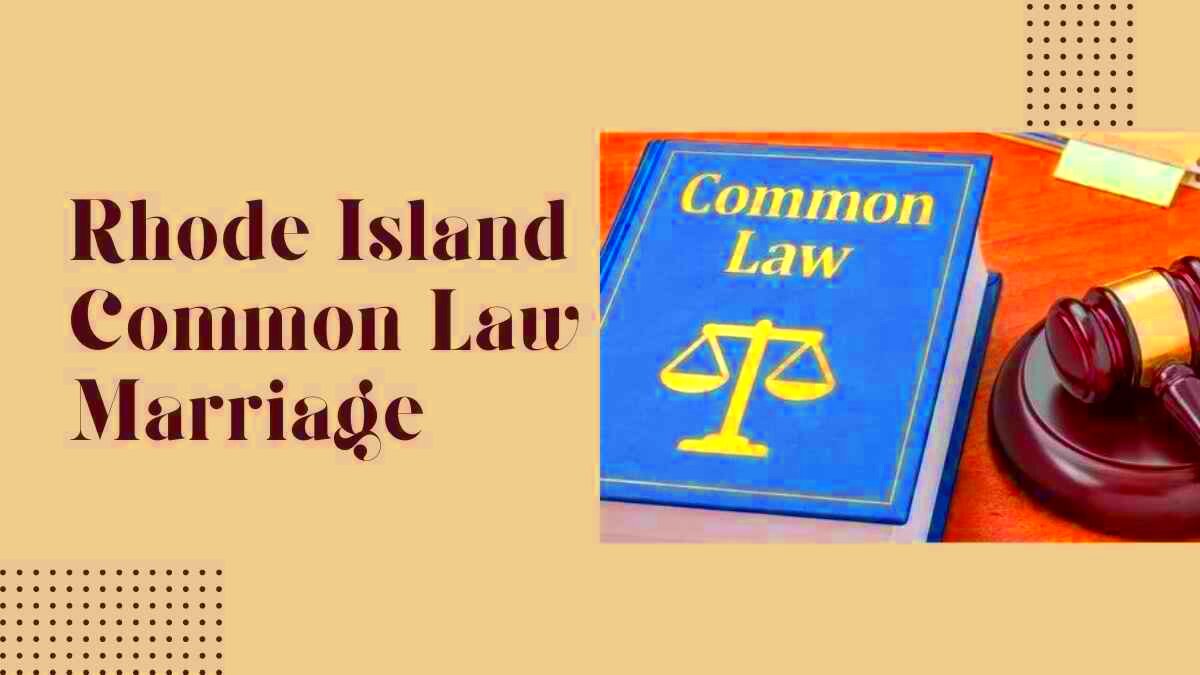Legal Aspects of Cohabitation and Marriage in Rhode Island
More and more people are choosing to live together without getting married. In Rhode Island the laws regarding cohabitation provide a different viewpoint on relationships compared to traditional marriage. For some the decision to cohabit instead of tying the knot is based on their values or practical reasons. Nevertheless it is essential to grasp the legal aspects involved in order to navigate this living situation smoothly.
In Rhode Island people who live together without getting married do not have the same legal protections as married couples. While marriage has established laws cohabitation does not have a clear legal structure. As a result many of the rights and responsibilities that come with marriage do not automatically extend, to cohabiting partners. This loophole in the system can create challenges in situations such, as property disagreements financial responsibilities or even child custody matters.
Based on my observations I’ve noticed that individuals often struggle to find their way after a breakup. The lack of established legal rules usually forces couples to lean on principles and their own private agreements. This can result in a lot of stress and ambiguity particularly when it comes to shared assets or children.
To keep yourself safe its a good idea to have open conversations with your partner about legal matters and think about creating agreements that cover things like how to divide property, financial obligations and other important aspects of living together. Taking this step can bring you some reassurance and clarity in case any problems come up.
Legal Differences Between Cohabitation and Marriage

In Rhode Island the differences between cohabitation and marriage hold importance. Marriage is an official agreement that outlines specific rights and responsibilities whereas cohabitation lacks a uniform framework of guidelines or safeguards.
Here are some key differences:
- Legal Status: Marriage is formally recognized by the state, whereas cohabitation does not have a specific legal status.
- Property Rights: Married couples have rights to property acquired during the marriage, while cohabitants do not automatically have such rights unless specified in a legal agreement.
- Inheritance: Spouses are typically entitled to inherit from each other without a will, while cohabitants may need to establish their rights through legal documents.
- Health and Insurance Benefits: Marriage often entitles spouses to benefits such as health insurance coverage, which cohabitants may not automatically receive.
When chatting with buddies and clients I frequently come across stories of the dilemmas and hurdles encountered by couples living together when they suddenly find themselves in tough predicaments. Without a structured legal system in place many facets of their relationship rely on understandings and the application of broad legal concepts.
Grasping these distinctions can assist people in making choices regarding their relationships and seeking suitable legal counsel to safeguard their interests.
Property Rights for Cohabitants

In Rhode Island the situation regarding property rights for cohabitants is quite intricate. While married couples enjoy well established entitlements to jointly owned assets those living together without tying the knot encounter a more ambiguous setting.
When it comes to cohabiting partners property rights are usually based on how the property is owned and any agreements they have in place. Here are some key points to keep in mind:
- Jointly Owned Property: If both partners have jointly owned property, they typically have equal rights to it. However, if the property is solely in one partner’s name, the other may have limited or no claim.
- Written Agreements: It’s highly recommended to draft a written agreement that specifies how property should be divided if the relationship ends. This can help avoid disputes and provide clarity.
- Contributions to Property: Contributions made towards property, whether financial or otherwise, can sometimes influence claims on property rights. Courts may consider these contributions when disputes arise.
Sharing personal experiences with friends who have gone through a breakup in a living situation sheds light on the difficulties that arise when it comes to property disagreements. In the absence of legal safeguards people often end up embroiled in protracted and expensive court battles to assert their claims. This underscores the significance of establishing agreements and being aware of your rights and responsibilities.
Cohabitants can navigate the complexities of shared property better and safeguard their interests by proactively seeking legal advice.
Legal Implications of Marriage in Rhode Island

For instance tying the knot secures that partners possess entitlements over each others assets whether acquired during their union or even beforehand in numerous situations. This implies that if you purchase a property while married both you and your partner hold claims to it. Conversely this also signifies that you can be held responsible for each others financial obligations. Its like a coin, with advantages and duties.
Here’s a summary of the legal aspects of marriage.
- Property Rights: In a marriage, property acquired is usually considered joint property, regardless of whose name it’s in. This joint ownership comes with implications for how property is divided if the marriage ends.
- Debt Responsibility: Both spouses may be responsible for debts incurred during the marriage. This includes loans and credit card debts, which can become a shared burden.
- Medical Decisions: Married couples typically have the right to make medical decisions for each other if one spouse becomes incapacitated.
- Inheritance Rights: Spouses usually have automatic inheritance rights, meaning they inherit from each other even without a will.
In my view the reassurance that marriage offers is comforting though it also brings its own challenges. Several of my friends have found value in the legal protection it offers particularly regarding matters like property and decision making. Being aware of these aspects can assist you in confidently and clearly navigating through married life.
How Divorce Affects Property and Assets

Going through a divorce can be really tough emotionally and when it comes to dividing property and assets things get even more complicated. In Rhode Island the way property is divided during a divorce is based on the idea of distribution. This means that belongings and debts are split up in a way that is fair although not always equal.
Here’s what happens when a marriage ends:
- Equitable Distribution: Assets and debts acquired during the marriage are divided based on what is deemed fair. This doesn’t always mean a 50/50 split but rather a division that considers various factors, including the length of the marriage and each spouse’s contributions.
- Marital vs. Non-Marital Property: Property acquired before the marriage or received as a gift or inheritance is typically considered non-marital and not subject to division. However, if non-marital property has been commingled with marital assets, it may be subject to division.
- Debts: Just as assets are divided, so are debts. Both spouses may be responsible for paying off joint debts, which can become a point of contention.
When talking to people who have experienced a divorce it’s common to find that the financial side of things adds quite a bit of pressure. Figuring out how to split up property and belongings can turn into a real struggle, especially if one partner thinks they put in more effort or if there are valuable assets at stake. Approaching this situation with clarity and seeking help is essential.
Child Custody and Support Issues
Divorce can be tough especially when it comes to matters like child custody and support. In Rhode Island the courts focus on what is best for the child which can make for decisions that are both complicated and emotionally charged.
Here’s a breakdown of how custody and child support matters are typically managed.
- Custody Arrangements: Custody can be either physical or legal. Physical custody refers to where the child lives, while legal custody pertains to decision-making authority regarding the child’s education, health care, and other significant areas. Courts may grant joint custody or sole custody, depending on what is deemed best for the child.
- Child Support: Child support is calculated based on both parents’ income and the needs of the child. The goal is to ensure that the child maintains a similar standard of living as they would have if the parents were still together.
- Modifications: Custody and support arrangements are not set in stone. They can be modified if there are significant changes in circumstances, such as a change in income or living conditions.
Based on what I’ve seen and heard from others dealing with custody and support issues it can be quite an emotional and challenging experience. It’s crucial to prioritize the well being of the child and seek guidance to ensure that the arrangements are equitable and serve the child’s best interests. Maintaining communication and being open to collaboration, even in tough situations can help make the process smoother.
How to Protect Your Rights in Cohabitation
Living together with a partner without getting married can have its perks and challenges. While marriage comes with clear legal safeguards cohabitation doesn’t have a set structure. This makes it crucial for couples to put measures in place to protect their rights. To ensure your interests are taken care of you need a combination of practical arrangements and legal safeguards.
Here are some ways to safeguard your rights when living together:
- Draft a Cohabitation Agreement: This document outlines how you and your partner will handle finances, property, and other important matters. It can specify how to divide assets in case of a breakup and establish financial responsibilities.
- Document Contributions: Keep records of any financial or non-financial contributions made towards shared property. This can be useful if disputes arise about ownership or financial contributions.
- Consider Legal Advice: Consulting with a lawyer who specializes in family law can help you understand your rights and the best ways to protect them. They can guide you on drafting a cohabitation agreement and other legal steps.
- Plan for Health Care and Decision-Making: Without the automatic rights of a spouse, make sure you have legal documents in place, such as powers of attorney, to handle medical and financial decisions if you become incapacitated.
Based on what I’ve seen, friends who live together tend to feel more at ease when they have these arrangements set up. It helps prevent any miscommunications or conflicts that could arise. By being proactive about this, both partners can have a clear understanding of their rights and obligations.
Steps to Take if Considering Marriage
Getting married is a big choice so its important to think it through carefully. Besides the feelings involved there are practical things you can do to make the move into married life smoother and safeguard your own well being.
Here’s a guide to help you prepare:
- Discuss Financial Matters: Have an open conversation about finances, including debt, savings, and financial goals. Discuss how you plan to handle money and whether you’ll have joint or separate accounts.
- Understand Legal Implications: Familiarize yourself with the legal rights and responsibilities that come with marriage. This includes property rights, inheritance laws, and potential impacts on taxes and health insurance.
- Consider a Prenuptial Agreement: If either partner has significant assets or specific concerns, a prenuptial agreement can outline how property and debts will be handled in case of a divorce. It can also address financial responsibilities and other issues.
- Prepare Emotionally: Marriage is not just a legal contract but an emotional commitment. Ensure that both partners are on the same page regarding expectations and future plans. Counseling or premarital workshops can be beneficial.
Based on my personal experiences and conversations with friends getting ready for marriage goes beyond just organizing the wedding. It’s about making sure both partners have similar expectations and are ready for the challenges that come with it. Taking this approach can ease the transition into married life and make it more rewarding.
Frequently Asked Questions
When it comes to legal issues related to living together or getting married it’s normal to have inquiries. Here are a few commonly asked questions to shed some light on the subject.
- What is a cohabitation agreement? A cohabitation agreement is a legal document that outlines how you and your partner will manage finances, property, and responsibilities during your cohabitation. It helps protect your interests in case of a breakup.
- How does property division work in a divorce? In Rhode Island, property division during divorce follows the principle of equitable distribution. This means assets and debts are divided in a manner that is fair but not necessarily equal, considering various factors such as contributions and the length of the marriage.
- What are my rights if we break up and I contributed to the property? If you’ve contributed to property or finances during a cohabitation, having a cohabitation agreement or proof of contributions can be crucial in asserting your rights. Legal advice can help navigate disputes.
- Can a prenuptial agreement protect me? Yes, a prenuptial agreement can help protect your assets and outline financial responsibilities. It’s especially useful if you have significant assets or specific concerns about property and financial arrangements.
- What should I consider before getting married? Consider discussing financial matters, understanding legal implications, and preparing emotionally. A prenuptial agreement may also be beneficial depending on your circumstances.
By tackling these inquiries you can gain a clearer understanding of your entitlements and obligations. This will ensure that you are ready for living together or tying the knot. Staying knowledgeable and taking steps in advance are crucial for approaching these significant life choices, with assurance.
Conclusion
Navigating the legal aspects of living together or getting married in Rhode Island can be challenging. However it’s crucial to understand your rights and obligations. Whether you’re cohabiting without a marriage or preparing to say I do being proactive about legal agreements, financial matters and personal expectations can greatly impact your journey. Based on my own experiences and the stories shared by others it’s evident that clear communication is essential. By taking steps and seeking legal counsel when needed you can safeguard your interests and nurture a healthier more secure relationship. Remember that planning for the future involves not protecting yourself but also establishing a strong foundation for your relationship to flourish.


